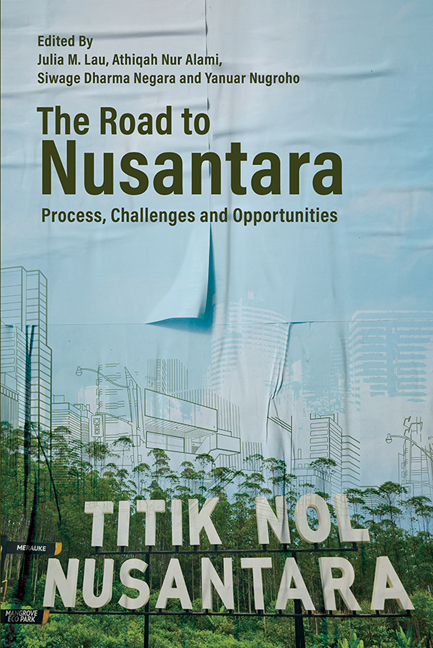Book contents
- Frontmatter
- Contents
- List of Figures
- List of Tables
- Foreword
- Foreword
- The Contributors
- Glossary
- Introduction: The Road to Nusantara—Process, Challenges and Opportunities
- PART I PROCESSES AND PATHWAYS TOWARDS NUSANTARA
- PART II CHALLENGES IN DEVELOPING NUSANTARA
- PART III OPPORTUNITIES FOR NUSANTARA
- Conclusion: Shaping Nusantara
- Index
1 - Nusantara: A Historical Perspective
Published online by Cambridge University Press: 01 March 2024
- Frontmatter
- Contents
- List of Figures
- List of Tables
- Foreword
- Foreword
- The Contributors
- Glossary
- Introduction: The Road to Nusantara—Process, Challenges and Opportunities
- PART I PROCESSES AND PATHWAYS TOWARDS NUSANTARA
- PART II CHALLENGES IN DEVELOPING NUSANTARA
- PART III OPPORTUNITIES FOR NUSANTARA
- Conclusion: Shaping Nusantara
- Index
Summary
Introduction
The relocation of the Indonesian state capital city is not a new issue. Historically, this policy has been echoed in the eras of Indonesia's past presidents Sukarno, Suharto and Susilo Bambang Yudhoyono (SBY). The lessons that can be learnt from the relocation policies in these three presidential eras are related to top-down and reactionary policies to domestic and international problems. For example, the policymakers took into account security and geopolitical tensions (external concerns) and environmental risks (domestic concerns).
Across the different administrations, the presidents directly initiated a top-down policymaking process when responding to the changing conditions during their administrations. For President Sukarno, it was more about the need for a new identity as the glue of solidarity between Java and outside Java, and for symbols for Indonesia as a leading “third world” country post-decolonization. In the era of President Suharto, this focused on the need for a new economic centre for economic equity and for an independent city that was regionally and globally competitive. The next few transitional governments under B.J. Habibie, Abdurrahman Wahid and Megawati Sukarnoputri arguably did not prioritize capital relocation. Instead, these presidents’ signature policy legacies included the first direct presidential elections (after Megawati), domestic reconciliation and anti-corruption drives. The idea of capital relocation returned under President SBY, whose policy was more of a reaction to the potential for bigger ecological disasters such as floods, the subsidence of the soil layer and uncontrolled population density in Jakarta.
Unlike the top-down relocation plans of Sukarno, Suharto and SBY, in the era of President Joko Widodo (“Jokowi”) the moving of the capital city and building a new one called “Nusantara” (or Ibu Kota Negara, IKN) is a mixed policymaking agenda that includes both an elite-driven agenda and a bottom-up one. Advocacy for the relocation of the capital was provided by the “Vision Indonesia 2033” team (since 2008) with Andrinof Chaniago as the pioneer and initiator. When Andrinof was subsequently appointed Minister of National Development Planning/Head of National Development Planning Agency (Bappenas), this idea was further developed into a policy draft paper starting in 2015. From there, a comprehensive agenda was formed, which eventually resulted in IKN Law No. 3 of 2022 (hereafter, UU IKN).
- Type
- Chapter
- Information
- The Road to NusantaraProcess, Challenges and Opportunities, pp. 11 - 31Publisher: ISEAS–Yusof Ishak InstitutePrint publication year: 2023

